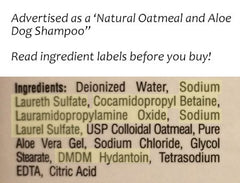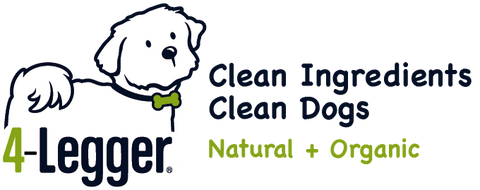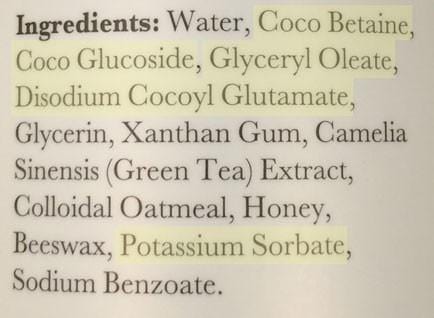The Greenwashing of Natural Dog Shampoo

When one of 4-Legger's founders was diagnosed with cancer on the day that her beloved toy poodle passed away from cancer, we all began to look at the ingredients in our food and self care products. We were astonished to see what we were consuming and applying to our bodies.
We worked to cut out processed foods and began looking up ingredients. We wanted to know what everything was and what it did! We changed both our food and the food our 4-Leggers consume.
The food was the easiest change. We know what a coconut is... we know what a coconut looks like... it wasn't so easy to see a "coconut based surfactant" in a bottle. We were horrified to find that our "natural oatmeal and aloe" shampoos that we had purchased also contained ingredients (like sulfates) that may cause skin irritation (or worse).
Like many consumers, we believed if something said "natural" it was "safe". We learned that there are NO industry regulations for what can be labeled as "natural".
We read about "greenwashing" - making things sound healthy and natural when in reality they are far from what we have in our minds as "natural or organic". Unless a product is USDA certified to food grade standards, it is NOT organic.
We compiled a list of all of the ingredients that should be avoided in human and dog shampoos and educated ourselves on what was "really" safe and natural. We worked with medical doctors, veterinarians, groomers, herbal experts and pet shampoo manufacturers to develop our own formulations for safe and effective pet shampoos that we would use on our own dogs.
Here are the ingredients (with some of the side effects and known issues) that we do not use in 4-Legger shampoos:
-
Ammonium Laureth Sulfate
- Strip the hair of its natural oils and may cause cancer - but it starts as a coconut!
-
Artificial Colors
- (Yellow 6, Red 40, Red #4, etc.)
- The European Union has placed regulations on labeling food dyes to inform customers of the health risks. The USA has not passed any requirements. Artificial colors can cause rare alergic reactions and many have been linked to cancer.
-
Cocamidopropyl Betaine (Coco betaine or cocobetaine)
- An environmental toxin that affects the immune system which is derived and altered from coconut oil.
-
Cocomide DEA or DEOA (Diethanolamine), MEA (Monoethanolamine) or TEA (Triethanolamine)
- A common surfactant with a creamy texture that causes foaming action.
- Have been linked to cancer
- Originated from ... you guessed it ... a coconut!
-
Doazolidinyl Urea
- A formaldehyde slow releaser
-
Formaldehyde
- Used as a preservative, there are many derivatives and formulations of formaldehyde as it is used as a fungicide, germacide, and disinfectant
-
DMDH hydantoin, DMDM hydantoin, or imidazolidinyl urea
- These are formaldehyde donors or derivatives of formaldehyde.
- Have been linked to allergies, weakened immune system, cancer, and other health issues.
-
Fragrances (Synthetic)
- Many fragrances found in shampoos are synthetic, not natural.
- Examples are parabens & phthalates which may be toxic
- They do not usually contain natural essential oils or if they do, it is a very small percentage.
- Synthetic fragrances can cause allergic reactions and dry skin
- Consider how sensitive your dog's sense of smell is compared to yours before using these or if your dog suffers from dry skin
-
Isopropyl alcohol (Also called isopropanol, 2-propanol, propyl, and SD-40)
- Not the worst of them and in small doses, can be used for certain conditions; but in general you would not want it covering all of the skin at one time
-
Methylchloroisothiazolinone
- A preservative and anti-fungal that has been banned in Canada and Japan
-
Methylparaben
- A preservative and anti-fungal which is controversial. When on the skin, and ultraviolet light (like the sun) may cause it to increase skin aging and cause damage
-
Mineral Oil
- A petroleum derivative that coats the skin - preventing it from breathing, absorbing, and excreting. It also slows the natural development of the skin, causing it to prematurely age.
-
Parabens
- Used as a preservative
- Banned by the European Union in 2003, parabens have been linked to cancer and interfere with the production of hormones
-
Phthalates
- Used as a preservative
- Banned by the European Union in 2003, phthalates have been linked to cancer as well as causing damage to liver/kidneys
-
Polyethylene glycol (PEG)
- Removes protective oils from the skin and hair
-
Polysorbates
- A surfactant (detergent)
- Can cause tummy sensitivity issues in humans with bowel disease
-
Propylene Glycol
- Can cause skin irritation
-
Quarternjum-15 or quarternjum-15r
- Breaks down into formaldehyde. Is used as a preservative causing allergic reactions and dermatitis.
-
Sodium Laureth Sulfate (SLES)
- A surfactant (detergent)
- An inexpensive an very effective foaming agent
-
Sodium Lauryl Sulfate (SLS)
- A surfactant (processed detergent)
- An inexpensive and very effective foaming agent
- SLS is derived from a coconut but has been processed and is now a known skin irritant (can cause dry/itchy skin) that pollutes our groundwater.
- It has the ability to permeate the eyes, brain, heart, and liver.
- It is issued as a pesticide (kills insects) and herbicide (kills plants). The makers of SLS recently petitioned to have SLS listed as an approved pesticide for organic farming. The application was denied due to its polluting properties and potential for environmental damage.
We urge you to take the time to read the ingredients on your pet's shampoo, look up the side effects and decide if you want to risk using it on your companion. If there are no ingredients listed or if they are vague like "vegetable based..." or "coconut based..." - put it back on the shelf or navigate off the page! Then, switch to 4-Legger where you know we will only sell to you what we use on our own dogs. If you have any questions about our ingredients, please contact us!





